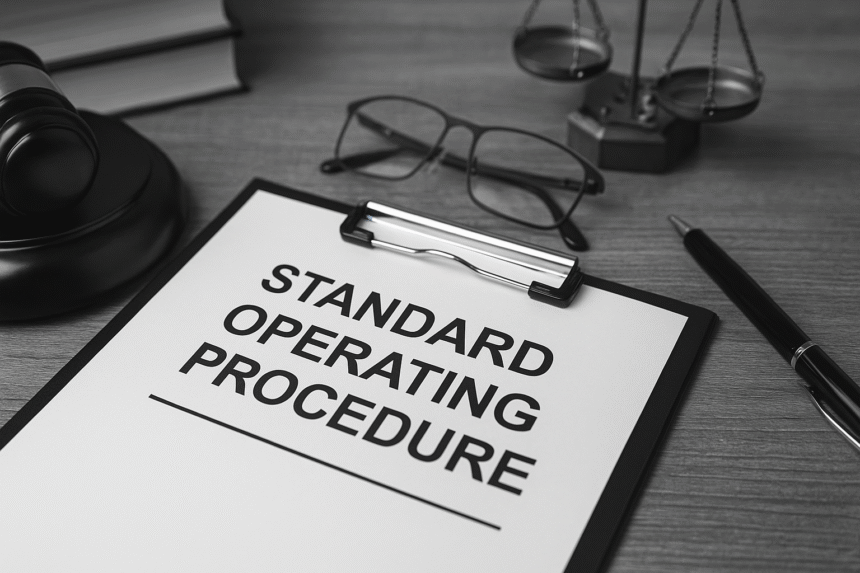SOPs Made Simple: Game-Changing Ways They Improve Your Business
Definition of Standard Operating Procedure (SOP) and Examples for Business Use
Quick Answer
A Standard Operating Procedure (SOP) is a written document that outlines the exact steps required to complete a specific task or process within an organization. It ensures that activities are carried out consistently, safely, and efficiently—especially when multiple people or teams are involved.
Breaking Down the Definition of SOP
A Standard Operating Procedure is more than just a checklist. It provides:
-
Clear, step-by-step instructions for routine or critical operations
-
Defined roles and responsibilities to reduce confusion
-
Quality assurance by maintaining consistency in execution
-
Compliance support by documenting procedures that align with laws, regulations, or standards
Standard Operating Procedures are not generic guidelines or policies—they are actionable documents designed for use by specific teams or individuals in specific situations.
Why It Matters in Business and Legal Contexts
SOPs matter because clarity reduces risk. In industries like manufacturing, healthcare, education, and professional services, SOPs are vital for:
-
Reducing human error
-
Training new staff efficiently
-
Proving compliance with legal or industry standards
-
Creating operational transparency
For example, an online education platform might have SOPs for:
-
Publishing new course modules
-
Verifying instructor credentials
-
Processing student complaints
This helps ensure the platform meets data privacy laws, accessibility standards, and consumer protection rules without relying on memory or improvisation.
In a legal setting, an SOP might also serve as evidence in disputes—for instance, if a client claims a service wasn’t delivered properly, the SOP can show how it was supposed to be done and whether the procedure was followed.
Legal and Practical Implications
SOPs carry more weight than many people think—especially when legal compliance is on the line.
1. Contractual Performance
When contracts require certain processes (e.g., ISO standards, GDPR compliance, quality checks), the Standard Operating Procedure becomes a tool for proving that obligations were met. This is essential in industries such as:
-
EV charging: safety and maintenance protocols
-
Mining: environmental mitigation procedures
-
Franchising: operational uniformity across branches
2. Risk Allocation
Failing to follow Standard Operating Procedures—whether due to negligence or unclear documentation—can shift liability in legal disputes. That’s why some companies require signed acknowledgment of SOPs as part of employment or vendor agreements.
3. Jurisdictional Variations
In regulated sectors, such as healthcare or financial services, Standard Operating Procedures may be required by law. In the EU, for example, SOPs are often audited during regulatory inspections. In the U.S., OSHA and FDA require documented procedures for various functions.
To understand how U.S. regulations require SOPs, refer to the official OSHA guidelines.
Example Use Case: Standard Operating Procedures in a SaaS Company
If you’re looking to deepen your understanding of SaaS, this guide offers a solid foundation.
Let’s say a SaaS platform processes sensitive client data. Its SOP for data access might look like this:
Title: Client Data Access Procedure
Purpose: To control and document access to client data by internal personnel
Scope: Applies to all backend support engineers
Steps:
-
Log a formal request in the internal ticketing system
-
Obtain manager approval via email
-
Access data only through a secure VPN and approved workstation
-
Log actions in the data access register
-
Close ticket with description of changes made
Retention: Logs stored for 2 years
Compliance: GDPR Article 32 – Security of processing
By following this SOP, the company can demonstrate compliance if ever audited or challenged in court. It also reduces risk of unauthorized access or accidental data breaches.
Summary Table: What to Know About Standard Operating Procedures
| Feature | Description |
|---|---|
| Full Form | Standard Operating Procedure |
| Purpose | Ensure consistency, quality, and compliance |
| Who Uses It | Teams across operations, HR, IT, compliance, logistics, etc. |
| Common Industries | SaaS, healthcare, education, EV, manufacturing, mining |
| Legal Relevance | Used for compliance, evidence, contracts, audits |
| Format | Typically includes title, purpose, steps, roles, documentation rules |
| Practical Benefit | Reduces error, saves training time, clarifies responsibility |
Call-to-Action
Want to create your own Standard Operating Procedure (SOP)?
Book a strategy call to review your legal documentation and risk controls.



Leave a Reply